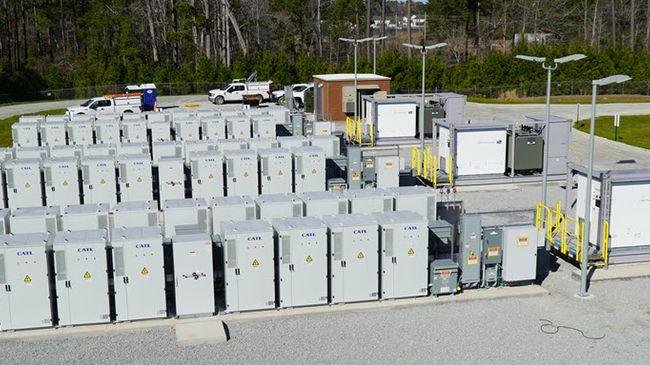Energy storage products do not pose any security threat! CATL Responds to Duke's Disconnection of Energy Storage Batteries in the U.S.
Polaris energy storage network was informed that on December 6, the U.S. utility company Duke Energy said it had disconnected CATL energy storage batteries due to a potential security threat.On December 7, Ningde Times publicly responded that allegations that its energy storage batteries posed a security threat were false and misleading.
Power companies disconnect energy storage batteries
On April 26, 2023, Duke Energy publicly stated that it used Ningde Times' batteries in an energy storage facility it was building at Marine Corps Base Lejeune.
Related reports indicated that Duke Energy was expanding its battery energy storage in North Carolina at the time and had begun commercial operations of the state's largest battery energy storage system. Located in Onslow County, the energy storage project is an 11MW energy storage system and operates in conjunction with the adjacent Marine Corps Base Lejeune 13MW solar facility, providing zero-carbon energy.

Foreign media sources indicate that U.S. Republican Senator Marco Rubio and other lawmakers have written to U.S. Secretary of Defense Lloyd Austin, they believe that the use of CATL batteries in North Carolina military bases is "inexcusable", and demanded that it "immediately They asked him to "immediately rescind" the decision to install these energy storage batteries.
On December 6, local time, Duke Energy, one of the largest electric utilities in the United States, issued a statement assuring its stakeholders that the company had disconnected the CATL energy storage products used at the U.S. Marine Corps Base Camp Lejeune in North Carolina due to a potential security threat, and that the company had said that the energy storage system was designed with "safety in mind". "security in mind" and that the batteries are not connected to the network or other systems at Camp Lejeune."
Isolating the battery system from the network in the face of potential cyber threats is a proactive way to protect the power source and maintain data integrity, making the battery system less vulnerable to hacking or cyberattacks.
However, Duke Energy did not specify when the battery was disconnected or how long it would be disconnected.
CATL refutes the response
On December 7, 2023, CATL responded back to Duke Energy's disconnection of the batteries by saying, "The allegation that CATL batteries pose a security threat is false and misleading." "Our products have passed rigorous safety and security reviews, including by U.S. authorities and corporations."
CATL said the energy storage products it sells in the U.S. contain only "passive" devices and do not have communication interfaces that would allow CATL to control the products it sells. At the same time, CATL U.S. products do not have the ability to collect, transmit or send data, and therefore do not pose any security threat.
CATL also mentions that its products cannot directly interact with or impact the U.S. power grid, nor can they directly interact with the grid or any other critical infrastructure. CATL provides energy storage batteries to energy storage integrators in the U.S. It is the integrator that manages the connection of the energy storage products to the grid, and with the extra layer of security measures set up by the grid operator, C products cannot interact with the grid.
CATL further stated that as a public company, it makes financial and organizational disclosures and filings in accordance with all applicable rules. Its investors include large Western firms such as JPMorgan Chase and UBS. Like every publicly traded company, CATL bears the responsibility of promoting the interests of its investors above the level of others.
U.S. seeks to get rid of Chinese firms as demand for energy storage soars
The installed base of utility-scale battery energy storage systems in the US is surging as renewable energy becomes more popular. A large portion of that capacity is likely to be provided by Chinese manufacturers, as Chinese energy storage suppliers are the current leaders in energy storage technology and will benefit from U.S. renewable energy tax credits.
But this state of affairs raises concerns about the security of the U.S. defense economy. Democratic Senators Mark Warner (D-Va.) and Joe Manchin (D-W.Va.) called on the Department of Energy in November to prioritize U.S.-developed energy storage technologies, arguing that the status quo of a "near-monopoly" in Chinese battery production constitutes a "significant defense and economic security vulnerabilities."
According to foreign experts, energy storage systems require frequent remote operation, and telecommunication equipment connected to batteries may be vulnerable to hacking.
The U.S. Department of Energy had highlighted the risks associated with grid-connected battery energy storage systems in an October 2022 report, with the document warning that attackers have shifted their focus to hardware and software vendors seeking to "add backdoor functionality that allows unauthorized access and control." In a worst-case scenario, coordinated attacks could destroy the energy grid, according to foreign experts.
Mike Casey, director of the U.S. National Counterintelligence and Security Center, said companies should think twice before installing Chinese batteries.
Next:Why is battery storage important and what are its benefits
Previous:Discover MC-I: BYD Energy Cutting-Edge Industrial Energy Storage Solution
